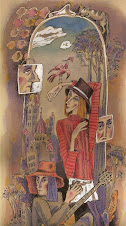The Myth of Writer's Block: How to Get Unstuck and Stay Unstuck
You don't have to experience writer's block. Ever.
You don't have to sweat over the blank page. You don't have to chew your pencil (or fingernails) to the nub. You don't have to wonder where the next word is coming from.
Writer's block is a myth -- not because you won't ever feel stuck but because there's no reason for you ever to stay stuck.
Do you wonder where your next breath is coming from? Unless you suffer from some sort of lung disease, you rarely think about your breath. You assume it will come and it does. One breath and then another...and then another.
It comes because you let it, because you don't get in its way, because you're not thinking about it or worrying about it.
Words can be like that, too.
If you trust in your story, in its inherent wisdom, the words always come. The words always come because they're already there. They're there because, in some sense, your story already exists.
It exists in the same invisible realm in which your dreams, visions and ideas exist. And if you believe in that existence, if you trust in that existence, if you know deep in your heart that your story is already present and smarter than you are, you will never lack the words your story needs for its expression.
By the way, I use the word "story" in its broadest sense, to encompass all that you would write -- fiction or nonfiction, novel or screenplay, short story or poem. Everything you write, everything you experience, everything you share: It's all story.
So how do you get to that place where the story's words flow as effortlessly as your breath?
By writing. By writing without stopping...without stopping for any reason that could give your critical, judgmental, doubtful, cynical or analytical selves any opportunity for input during these initial, creative stages.
I call this nonstop approach "writing on the Muse Stream" because I believe that when we surrender to our Muse, creativity pours through us as effortlessly as water in a free-flowing stream.
It's natural to want to edit as we go, to want to stop to correct spelling, punctuation or grammar or to grope for the right word.
Don't do it. If you can't think of a word, leave a blank space or write xxx. If you don't like a word you’ve written, mark it in some way and move on. Don’t stop.
"Fine words," I hear you say. "But I'm still stuck."
You may be stuck, but you're not blocked. And you certainly haven't lost your creative ability.
You can't lose something that's an innate part of you, that's an innate part of everyone. Creativity is as natural as breathing and as long as you're breathing, you can write.
Here are seven reasons why you might be feeling stuck and some ways to get unstuck.
Fear
Are you discovering things about yourself or your beliefs through your writing that are making you uncomfortable? Is your story carrying you into new, potentially dangerous territory?
Fear will always block us from moving forward in our writing, if we let it. The only solution is to keep writing -- through the fear. Past the fear.
Your fears -- and all your emotions -- can be the most powerful components of your writing. Don't run from them. Write them.
Control
When we assume that we're in charge of the story, that it has to look or sound a specific way, conform to a particular genre or format, or match a certain outcome or expectation, we're bound to get stuck.
Your story has its own imperative and its own wisdom. You override those at your peril.
Abandon control. Let your story express itself. Let your Muse have its way with you. Let the words spill out of you -- the words your story needs, not the words you think you need.
Write on the Muse Stream, and just keep going. If you find yourself getting stuck, simply repeat your last word or sentence (or any word or sentence). Repeat them over and over and over and over again until you find yourself back in the flow. And you will.
Rhythms & Routines
Human beings like routine. We like breakfast at a certain time and a certain kind of muffin with our Starbucks coffee.
As writers, we often prefer to have set writing times and patterns: writing in a certain room, using a certain pen and sitting down at a certain time.
Routines, however, can turn into ruts. What worked yesterday may not work today...or ever again.
If you're feeling stuck, you may well be stuck -- in a pattern that's not working anymore.
Try new rhythms and routines. Break existing patterns.
Go for a walk, do yoga stretches, take a shower or do something else unrelated to writing or to your current project. Drive to a scenic spot and write in the car. Write in the morning instead of the afternoon, longhand instead of on the computer, in a café instead of at home.
Find the rhythm and routine that works for you today, and be open to changing it tomorrow.
Perfectionism
Whether in writing or in life, many of us are addicted to getting it right. Being perfect means we won't be criticized, judged or rejected. A perfect first draft means fewer revisions. Being perfect is, well, just a good thing to be. Isn't it?
I’ve got bad news: It will never be perfect. It may be excellent, accomplished, creative, innovative and insightful. But perfect? Not possible.
It's not possible because there's no perfect way to translate the intangible (ideas, thoughts, visions) into words on a page. There's no perfect way to describe a brilliant sunset or profound emotion in a way that guarantees each reader an experience identical to yours.
Do your best. But if you're intent on making it perfect, you may find yourself stuck on the same story -- or sentence -- for the rest of your writing life, never growing into something new.
Timing
Recognize that what appears as a block may be a matter of timing. If you've written as deeply into a story as you can and find yourself unable to continue, it may be that you need more life experience (or research) before you're ready to go on.
Instead of calling yourself "blocked," welcome the break -- to do research, to work on a different project or to get on with your life, trusting that you'll know when it's time to get back to it.
Passion
If you're feeling stuck, ask yourself whether the story is one that excites and impassions you, one that fires you up more than anything else you could be writing. Is it the right idea for you right now? Or is it just another good idea that anyone could write.
If you've lost the excitement (or never had it) and cannot rekindle your enthusiasm, consider that this may not be the best project for you at this time.
Lack of passion is a guaranteed recipe for stuckness. Passion, on the other hand, will always fuel your writing.
Self-Respect
Respect yourself and your writing. Respect every draft. Every word.
The more you beat yourself up over your writing, output or creative ability, the more you're inviting the kind of paralysis that feeds writer's block.
Discard judgment and punishing discipline. Cultivate discernment and discipleship. Recognize that every word, draft and emotion is an integral part of your creative journey. Honor all aspects of that journey -- including the painfully uncomfortable ones -- and writer's block will become a myth for you, too.
(c) 2009 Mark David Gerson
Adapted from The Voice of the Muse: Answering the Call to Write (LightLines Media, 2008)
"Writer's Block" message pad available from TheDailyPlanner.com
Writer's block cartoon by Rusty-Siccors
Posted by Mark David Gerson at 4:44 PM
Labels: control, fear, muse stream, myth, passion, perfectionism, self-respect, surrender, writer's block
I Left MAGA Host SPEECHLESS on CNN
2 weeks ago










No comments:
Post a Comment